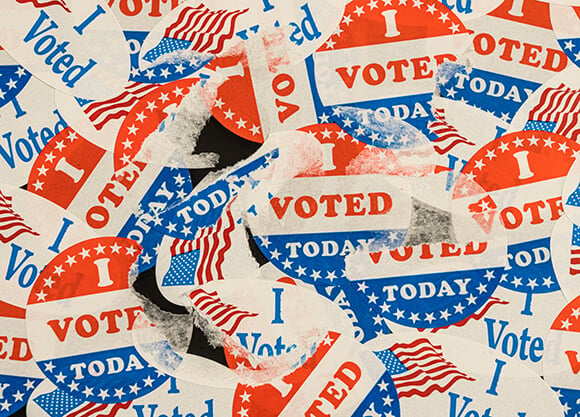
Symposium examines way of protecting, promoting the American right to vote
November 01, 2021

November 01, 2021

The symposium reflected on the battles Americans endured to gain the right to vote, and how many are still in the fight. Quinnipiac Professor of Law Marilyn Ward Ford recalled the civil rights work done by late U.S. Rep. John Lewis. His legacy lies in the peaceful protests of barriers that made it more difficult to vote, such as literacy tests and a voting tax.
Panelist Johnnie Booker, a retired diversity executive for corporations, including Coca-Cola, spoke of her civil rights experience. She was in high school when the Voting Rights Act of 1965 passed and was became law. The act enforced the voting rights of the 14th and 15th Amendments, reinforcing the definition of citizenship and prohibiting states from disenfranchising voters.
In 1967, she was introduced to Lewis when she worked with the Voter Education Project where he acted as field director. The project worked to register and teach people how to vote, as well as to conduct research around voting in the South. While the organization primarily focused on mobilizing the Black community, Lewis helped to spearhead the Southwest Voter Registration Education Project for Latinx citizens, said Booker.
“I believe John Lewis was destined to do this type of work. He was ordained to be an advocate for civil rights,” she said.
Decades later, the right to voting access is still not guaranteed. In response to a litany of state-level provisions detrimental to inclusivity, the John R. Lewis Voting Rights Advancement Act was introduced in the House in 2021. U.S. Congresswoman Terri Sewell of the 7th U.S. Congressional District in Alabama, and chief sponsor of the act, shared insight into its importance.
“If passed, the act would restore voter preclearance by coming up with a modern-day formula. In 2021, more than 400 bills were introduced that create voter suppression, restrictions and barriers. Thirty-three bills became law,” said Sewell. She cited the new law in Georgia outlawing the distribution of food and water to waiting voters as one example.
Grassroot organization is key to congressional change, she said.
“Old battles are new again and the modern-day barriers are no less pernicious. It’s not enough to say that we stand on the shoulders of giants. We have to do our own work,” said Sewell.
Other laws limiting early voting times and barring the state-distribution of absentee ballots in Georgia compound to make the state of voting even more complicated, said Dov Wilker, regional director, American Jewish Committee in Atlanta and the AJC National Director for Black Jewish Relations.
“We have found as minority communities that we have the responsibility to advocate together as these groups continue to endure oppression. Municipal voting is as important if not more important than federal law. If we all vote on this redistricting cycle, it will lead to greater responsibility to issues outside the metro into our rural areas,” said Wilker.
Just as it was decades ago, the importance of educating potential voters is paramount for greater change. “Current events say to us that we have to work as hard as we did prior to 1965. We cannot sleep; we need to get everyone out to vote. We need to do another voter education project nationwide, to educate, research, train and take people to the polls,” said Booker.
Modern civil rights advocates aren’t only in the political arena. Pastor Sedgwick Daniels of Holy Redeemer Church of God in Christ in Wisconsin said that he felt that it was his duty as a community leader to educate his parish on the importance of voting.
“The church engaged in a way it hasn’t for many years, to remind people to vote. Every time you make comment over pulpit, you had to be careful of language so you are not promoting one group or another. I stress the need to have an opinion, and the civic responsibility of voting,” said Sedgwick.
Of particular importance is working with those considered to confused voters, he said. This group includes the estimated 9 to 17 million formerly incarcerated individuals who are under the false impression they aren’t able legally to vote.
“Many eligible voters don’t because they fear returning to jail. The educated voter is an empowered voter. We can’t rely on state websites to provide clear answers for those with questions,” said Barbara Arnwine, president and founder of the Transformative Justice Coalition, and former executive directo of the Lawyer’s Committee for Civil Rights Under Law.
The panel closed with speakers echoing a deceivingly simple call to action: To vote.
“Fighting for the right to vote is nothing new in this country. We’re asking you to not stop. Get into some good trouble and join the fight,” said Rhonda Briggins, the organizer and co-founder of Vote Run Lead; co-chair of Delta Sigma Theta National Social Commission; and former president of the Georgia Transit Association.
Quinnipiac Today is your source for what's happening throughout #BobcatNation. Sign up for our weekly email newsletter to be among the first to know about news, events and members of our Bobcat family who are making a positive difference in our world.
Sign Up Now